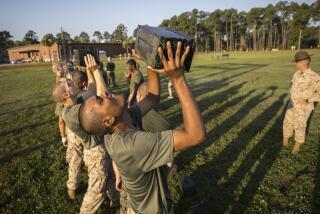Marines Are Eager to Capture Fallouja
- Share via
FALLOUJA, Iraq — The sun was rising Saturday over the trash dump the Marines had been using as a staging area for the assault on insurgents here, and Sgt. Andy Folk was happy. The news had been passed to the grunts the night before.
“Today is going to be a good day,” Folk, 27, of Bangor, Pa., said as he grabbed a bottle of water and an MRE, or meal ready to eat, for the long day ahead. “Today we’re going on the attack.”
After an off-again, on-again 24 hours when offensive operations were suspended, the Marines were adding a third infantry battalion and launching a new push into this Sunni Triangle city. The effect on morale was immediate -- and despite a pause in the action later Saturday, the mood remained upbeat.
“I know that with every military plan you’ve got to be flexible, but it seemed like we were in Stage 1 for five days rather than the 24 hours we planned,” said Cpl. Samuel Nelson, 21, of Ripon, Calif. “Once we get pushing through, we’ll get the job done.”
By institutional culture, Marines are impatient, with a low threshold for boredom. Even in training exercises in the California desert, the goal is to keep moving, to practice what in Marine jargon is called “fire and maneuver.”
“The Marines don’t like sitting anywhere,” said Master Sgt. Stephen Davis of Waycross, Ga., who has spent 24 years in the corps.
“We’re Marines,” he said, as if no further explanation was necessary.
For the young Marines, there is the exuberance of battle, for which they have been in training since they arrived at boot camp.
“When we’re sitting in the same place, the enemy gets an advantage because he knows where we are,” said Lance Cpl. Zong Xiong, 22, of Eau Claire, Wis. “When we’re moving, we have the advantage.”
For older Marines, there is concern about the effect the experience of vicious urban combat will have on their younger comrades.
“For many of the young ones, it will make them a better person -- teach them how to master fear and how far they can push themselves,” said Master Sgt. Martin Payotelis, 44, who served in the 1991 Persian Gulf War, Somalia and last year’s assault on Baghdad.
“But I wonder about some of them when they return to normal life after this,” he said.
The poor performance of the Iraqi security force has caught the attention of top officers and enlisted alike. Col. John Toolan, commander of the 1st Marine Regiment, is increasingly exasperated at the sight of Iraqi police officers fleeing the city, while the Iraqi army is largely a no-show and the Iraqi Civil Defense Corps only slightly better.
The drive to “put an Iraqi face” on the Marines’ offensive against the insurgents has had only marginal success.
The possibility that the Marines’ effort could be for naught, once sovereignty is returned to the Iraqis and the Iraqis begin assuming responsibility for rooting out insurgents, is not a cause for happiness.
“I just hope we end improving this country,” said Lance Cpl. Anthony Cruz, 20, of San Diego, huddled in a fighting hole as protection against mortars and rocket-propelled grenades. “Otherwise, I’ll figure this was a waste of time.”
But those are long-range thoughts. Of more immediate significance Saturday was that the drive toward crushing the insurgent movement was beginning to shift into high gear.
“The sooner we get Fallouja cleaned up, the closer we are to going home,” said Sgt. Michael McMahon, 27, of Dallas. “I’m glad we’re pushing.”
More to Read
Sign up for Essential California
The most important California stories and recommendations in your inbox every morning.
You may occasionally receive promotional content from the Los Angeles Times.













